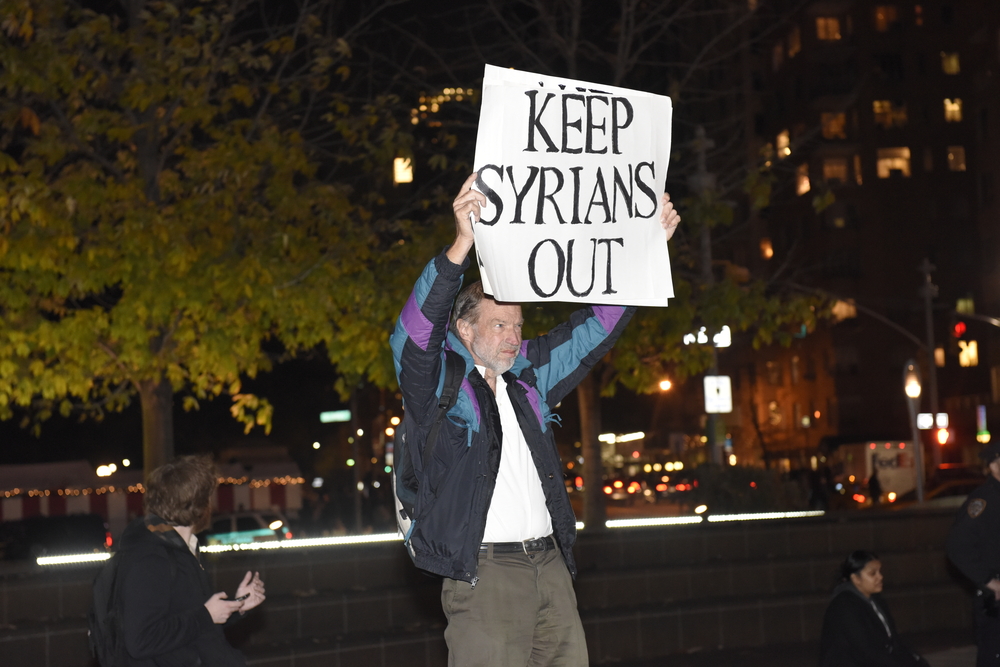Student Author
Annika Ford, Chapman University
NOTE: Student submissions of soluprobs are welcomed at babbie@chapman.edu
Presumed Issue:
Granting access to Syrian refugees is a security threat to the United States because terrorists or so-called Islamic militants could gain access to the U.S. by posing as refugees. We do not have enough information about the refugees who are being settled here, and we cannot possibly screen them all.
Solution:
Allow state officials to block the resettlement of Syrian refugees in their states.
Narrative:
In September 2015, President Obama announced a plan to admit 10,000 Syrian refugees into the U.S. by September the following year. In August 2016, one month ahead of schedule, the United States welcomed its 10,000th refugee. However, in the months after President Obama’s announcement, governors from 30 states across the U.S. voiced strong objections to Syrian resettlement in their states, stating publicly that they would attempt to halt such actions. Some officials only expressed opposition, while state officials in Texas, Alabama, and Indiana filed lawsuits against the federal government. In Texas, state agencies argued that they had not been adequately consulted about placing refugees in their state. Officials even filed a temporary restraining order to block refugee arrival, though it was quickly overturned. In Indiana Governor Mike Pence filed a lawsuit against the Obama administration, and also attempted to hinder resettlement by interfering with federal funds allotted for Syrian refugees in the state. In response, a federal appeals court countered that Governor Pence had broken the law by accepting the federal money and subsequently declining to use it for resettlement purposes.
Although the lawsuits were struck down, they reflect a wider sentiment shared by many since President Obama’s announcement. There is a nationwide feeling that the acceptance of refugees escaping a five-year civil war is “opening the doors” of our country to Islamic militants. Additionally, this narrative has been perpetuated by President-elect Donald Trump, who has described the wave of refugees as a “Trojan Horse,”calling the acceptance of Syrians into the country a potential catastrophe. This characterization is reinforced by fears spurred after recent terrorist attacks in the West, including those in France and Brussels. For example, Governor Pence’s lawyers stated that the Governor was fulfilling his responsibility to protect the safety of Indiana residents. They cited federal officials who have acknowledged that terrorists are trying to infiltrate Western nations.
Is the Problem Real?
According to Evan Bonsall in the Harvard Political Review, the assumption that Syrian refugee resettlement is a national security threat ignores the facts. Entering the country as a refugee is already a stringent process and one of the hardest ways to enter the United States. Bonsall  cites Jana Mason of the United Nations High Commissioner for Refugees, who reported that those attempting to enter the U.S. under refugee status are the single most heavily screened and vetted category of persons. The process requires referrals and background checks by multiple government agencies, including the National Terrorism Center. In addition, Syrian refugees must go through added screening, with face-to-face interviews. All gathered information is extensively fact-checked and privately investigated. The Department of Homeland Security goes through every individual case, and approves or rejects each one accordingly.
cites Jana Mason of the United Nations High Commissioner for Refugees, who reported that those attempting to enter the U.S. under refugee status are the single most heavily screened and vetted category of persons. The process requires referrals and background checks by multiple government agencies, including the National Terrorism Center. In addition, Syrian refugees must go through added screening, with face-to-face interviews. All gathered information is extensively fact-checked and privately investigated. The Department of Homeland Security goes through every individual case, and approves or rejects each one accordingly.
Such measures have proved highly effective in regards to blocking potential terrorists from entering the country. In 2015, the Cato Institute released a report stating that of the 859,629 refugees who have been resettled in the U.S. since 2001, three were convicted of planning an attack. In addition,
There are many differences between Europe’s vetting of asylum seekers from Syria and how the United States screens refugees. The geographic distance between the United States and Syria allows our government to better vet those seeking to come here, while large numbers of Syrians who try to go to Europe are less carefully vetted. A lax security situation there does not imply a lax security situation here (Nowrasteh, 2015).
 Such differences are important to note because recent fears of terrorist attacks in the United States have been stirred in large part by attacks that occurred in Europe. The report concludes that in the U.S., the threat of terrorist attacks by way of Syrian refugees is widely over-exaggerated because our vetting system is so thorough.
Such differences are important to note because recent fears of terrorist attacks in the United States have been stirred in large part by attacks that occurred in Europe. The report concludes that in the U.S., the threat of terrorist attacks by way of Syrian refugees is widely over-exaggerated because our vetting system is so thorough.
Negative Consequences
While the use of fear, exaggeration, and misinformation is certainly a negative consequence of the proposals to ban Syrian refugees, worst still is the added fuel to the anti-Muslim hysteria that already plagues this country. Meanwhile, the safety of Muslims who are living this country is increasingly threatened by violence, bigotry, and over-generalizations.
Sources:
Bonsall, E. (2015). Are Syrian Refugees Really a Security Risk? – Harvard Political Review. Retrieved November 7, 2016, from http://harvardpolitics.com/united-states/syrian-refugees-really-security-risk/
Nowrasteh, A. (2015, November 18). Syrian Refugees Don’t Pose a Serious Security Threat. Retrieved from https://www.cato.org/blog/syrian-refugees-dont-pose-serious-security-threat
U.S. Is On Target To Accept And Resettle 10,000 Syrian Refugees. (n.d.). Retrieved November 7, 2016, from http://www.npr.org/sections/thetwo-way/2016/08/05/488896247/u-s-is-on-target-to-accept-and-resettle-10-000-syrian-refugees
Federal Court Blocks Gov. Pence’s Attempt To Bar Syrian Refugees From Indiana. (n.d.). Retrieved November 7, 2016, from http://www.npr.org/2016/10/03/496466007/federal-court-blocks-gov-pences-attempt-to-block-syrian-refugees-from-indiana
Court Dismisses Texas Lawsuit To Block Syrian Refugees. (n.d.). Retrieved November 7, 2016, from http://www.npr.org/sections/thetwo-way/2016/06/16/482342990/court-dismisses-texas-lawsuit-to-block-syrian-refugees
Gershman, J. (2016). Appeals Court Skeptical of Pence’s Anti-Syrian Refugee Directive. Retrieved November 7, 2016, from http://blogs.wsj.com/law/2016/09/15/appeals-court-skeptical-of-pences-anti-syrian-refugee-directive/

